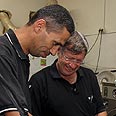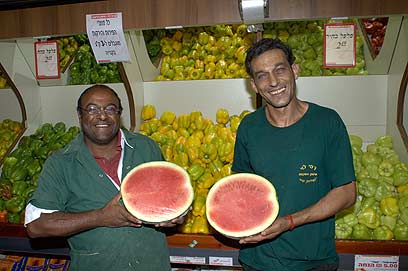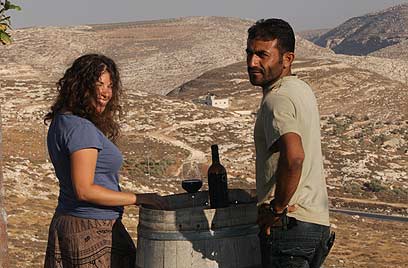
Peace with a paycheck
Palestinians and settlers work side by side in dozens of stores, factories, wineries, and restaurants in West Bank. Tension exists, but hatred and anger left at home. Islands of co-existence located in sea of mistrust
Talks of boycotts alongside reports of violent "price tag" retribution policies. In pictures, one can see the hostility, the rage, in people's eyes. The words we hear coming from the mouths of politicians and leaders on both sides are indicative of a bitter conflict, the kind only God knows when and how it can be solved. However, in reality, it turns out that even in the land of moratoriums and boycotts, a quiet, authentic co-existence exists below the surface.
One hundred and thirty-four employees arrive at the Rami Levy supermarket in Shaar Binyamin every morning from around the area. Some of them come by bus from the towns of Beit-El, Kochav Yaakov, and Adam, while others, 60 in number, arrive in orange taxis from the villages of Hizma and Anata or by foot from the nearby Jab'a.
"We're kind of a family," said the store manager, Uzi Sharon. "There are no classes here. During the work, we forget what each person's extraction is. It really isn't important."

Co-existence in the Rami Levy supermarket in Shaar Binyamin (Photo: Atta Awisat)
In one of the departments, Halef from Jab'a and Avi from Adam sit next to each other. Every interaction between the two of them is accompanied by a friendly hug. "He's like my big brother," said Halef, the department manager. "After all, we live just hundreds of meters from one another."
"He's my best friend here," said Avi. "If we had the option, we would spend every Saturday together with the families."
Ever since the supermarket branch was opened five years ago, Palestinians and settlers work there in a near idyllic state. Their friendships continue even after work hours, though it is usually the Palestinians that visit their Jewish friends and not the other way around.
"There is a shelf stocker who invites us to family events and gatherings on Saturdays," said Sofian, manager of the grocery department.
"I wish I could visit the employees in the villages," said Uzi. "In the meantime, they come to us."
The co-existence in the supermarket, it turns out, also has an effect on the customers. "All of a sudden a settler and a Palestinian, sometimes from the two extremes of the conflict, let one another go first in line," said Uzi.
Even during difficult times, the workers say the tension does not spoil their good relations. "During Operation Cast Lead, we were worried about talking about the situation," said Avi. "But after terrorist attacks, for instance, we would curse together who did it and ruined things for everyone."
Recently, the employees have felt a slight sense of unease. The Palestinians announced a boycott of goods produced in the settlements, and rumors have started that a prohibition will soon be issued against working for Jews. "I have worked with Jews for 17 years. I even worked in Jerusalem with haredim," said Sofian. "I can't believe this will stop."
"It dissolves very quickly," ruled Uzi. "What is happening here is the real co-existence, growing from the ground up. A lot of leaders can learn from this place."
Owner Rami Levy admits that there is a lot of ideology involved in the supermarket. "We have three stores in Judea and Samaria," he said, "and Palestinians and Jews work together in them. If I can contribute to Jews and Arabs being able to live here together, all the better."
Abed al-Magrabe and Pini Huminar have known each other for years. Together they have experienced days of quiet and days of terror. It sometimes seemed like everything was falling apart in front of their eyes, but ultimately, their friendship won out.
Pini is the owner of a laundromat in Efrat. Abed and his brother Mohammad work for him as ironers. "There are no other employees like them," said Pini enthusiastically. "Jews don't like it. It's a different mentality. All of Efrat knows them. They are part of the town."

Elinor and Jamil at Psagot Winery. Part of the family (Photo: Atta Awisat)
In 2002, a Palestinian terrorist who worked in the town blew himself up in a commercial center. On instructions from the IDF, Pini was forced to fire the brothers. "For two years, I had Jewish employees who gave me a hard time," he said. "Two years later, just before Passover, there was an insane work load, and my employee decided to go home. I fired him on the spot. Left with no other alternative, I drove to al-Aroub to Mohammad's house. I brought him on the hush, without a permit. He saved the day, and ever since, Mohammad is here with a retroactive permit."
This week, Mohammad took vacation for Ramadan. Abed decided to stay on and work, managing Efrat's dirty laundry.
"Sometimes in the morning I tell Pini of my experiences, how there were IDF arrests in the village overnight," said Abed. "We talk about everything, even politics. We argue. We don't come to any agreements, but we maintain respect. We have an interest in making a livelihood, and life is stronger than anything else."
The al-Aroub refugee camp is considered hostile, but the al-Magrabe household is located on the main road, so Pini can stop by for a visit. Over the years, Pini and the brothers have woven together a unique relationship. They attend all of each other's family events.
"Except for Abed's wedding, which was at the height of the intifada," said Pini. "Now during Ramadan, I am considerate of them and give them vacation or allow them to leave early if they want. I already know exactly when their holidays fall according to the Hebrew date."
Talk of the upcoming ban against working with Jews has also reached al-Aroub, but Abed isn't flustered. "I'm not worried about it," he said. "After all, livelihood is from God. It's just a way of pressuring Israel. There are a lot of people in al-Aroub who work in the settlements. We hope and pray that things like this will bring peace, or at least will maintain quiet like now."
Coexistence in a pita
The Shamir Salads factory located in the Barkan industrial zone produces tons of hummus, tehina, matbouha, and other specialty salads every day. Ninety of the 120 employees come from local Palestinian villages. The rest are Israeli. On the production line, it is hard to tell them apart. The same hands wash, peel, and cut the vegetables.
"There is always talk of a new Middle East and of joint industrial zones. President Shimon Peres travels to every corner of the world for this end," said CEO Amiram Guy. "So here you go. We built such a thing here and co-existence is here."
Some 5,000 people are employed in 120 factories in the industrial zone. About half of them are Palestinian. "I heard they are being threatened with imprisonment and fines," said Amiram. "It is very worrisome and aggravating. I am worried about the factory, but also about our 90 employees. After all, they're not going to go throw rocks at Abbas, so they will direct their anger at us."
Yusuf, from neighboring village Kifl Harith and in charge of production at the Shamir factory, is not worried. "We don't believe it will happen," he said. "These are just empty declarations. Even in the village we eat these salads that the employees bring home. There are very good relations between us. We have been working together for years, since the previous intifada. Everyone has family and livelihood on his mind. This is the most important. What is more peaceful than working together?" he said.
The wine brotherhood
On the road to Migron, just across from the villages of Jab'a and Mikhmas, the Psagot Winery is located. The winery produces 80,000 bottles of wine a year, the vast majority of which make their way abroad.
We met Elinor Maizlish, 25, from Beit Horoun, and Jamil Jahalin, 30, who is living in a tent on a nearby hill, one floor above the winery.
"It's just a great job," said Jamil. "It is not just a salary for me, but is truly my home. My five kids come here to play. I also bring the goats to the area around the vineyard to eat grass. During big events, I bring the two camels and give the guests rides. With God's help, peace will come from here."
Jamil's relative, Hamoud, also works at the winery's visitor center. "Jamil and Hamoud do wonderful work," said Psagot General Manager Yaakov Berg. "It is prohibited to employ a non-Jew in the vineyard for kosher reasons, but they do everything in the visitors' center. In my opinion, true co-existence, beyond all the talking, is to live and work together. Whoever accepts our presence here is my best friend.
"At the end of Ramadan, I will send presents to all their children. It is not just employer-employee relations. There is a lifestyle here. If Jamil were to need an NIS 50,000 (about $13,000) loan right now, I would give it to him and trust him with my eyes shut. And the opposite is true, too."
Not all of the neighbors view Jamil and Hamoud's presence in a positive light. But Berg refuses to let it bother him.
"There are no compromises here," he said. "We support this move because it's important. What the Palestinian Authority wants to achieve is not what is happening on the ground. People want to live like human beings. For the same work in Ramallah, Jamil would receive NIS 1,000 (about $262). With me, he receives five or six times as much with insurance and social benefits.
"Just this week, when the security alarm went off in the middle of the night, my first phone call was to Jamil because he lives a meter from here and could arrive immediately. We are all dependent on one another."
- Follow Ynetnews on Facebook










